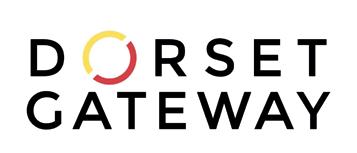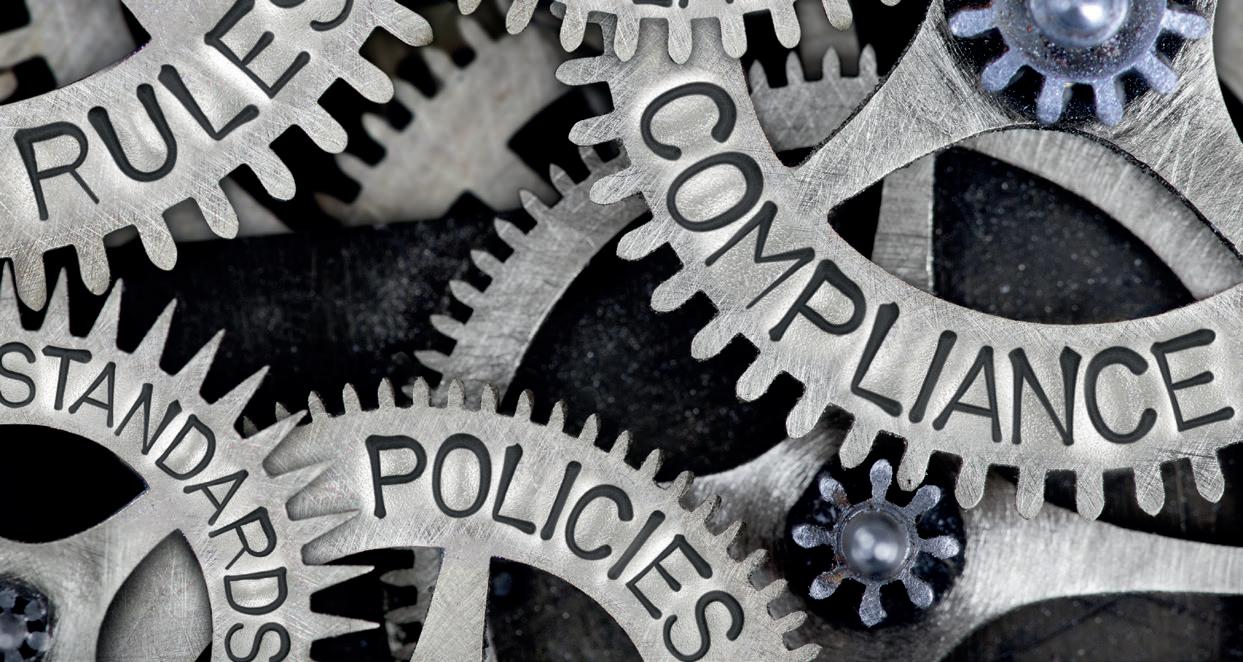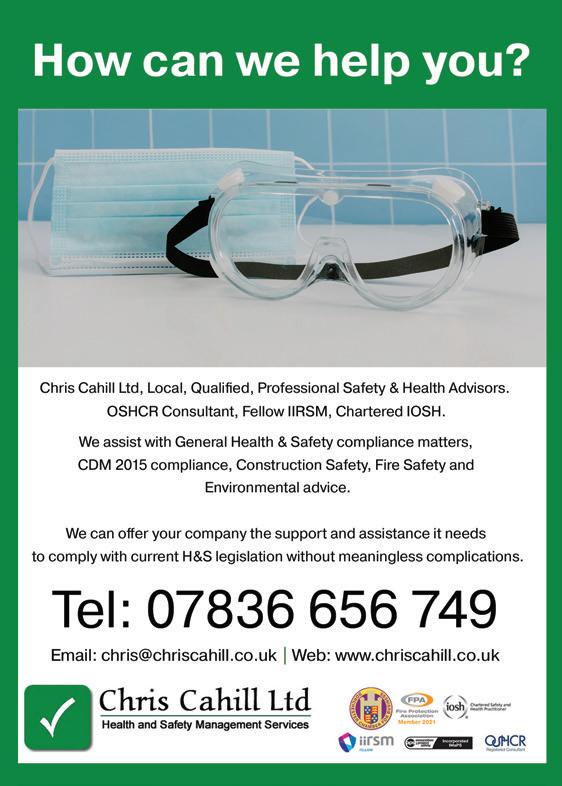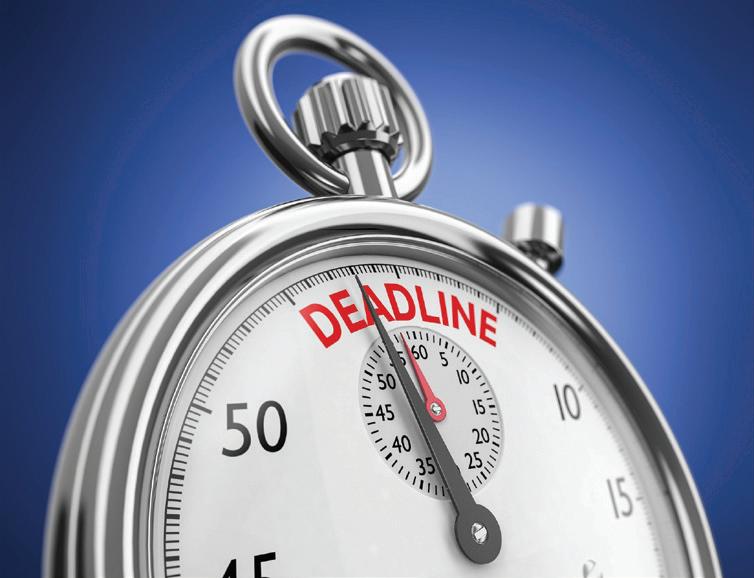
7 minute read
Compliance made easy41 International trade
Compliance made easy
No matter what sector your business is in, you will have key regulations that you must comply with. Compliance can often be viewed as ‘dull but essential’ but is, in reality, super-important – like fire safety, environmental health and trading standards. Well, how do you manage them?
Advertisement
If you tackle each one separately with a different regulatory agency, you’re almost certainly missing out on a more efficient way of doing things. It’s called a Primary Authority partnership.
As a scheme, Primary Authority has been in operation for more than a decade, helping businesses across the country to get accurate, consistent regulatory advice that makes compliance simpler and easier. There are lots of benefits, that ultimately mean you’ll get more time back to work on growing your business: • Receiving all your regulatory support in one place • Having a single point of contact for enquiries, with agreed response times • Access to assured, professional and tailored regulatory advice • Support with complaint monitoring to identify trends • Developing a positive and collaborative relationship with local regulators You can form a Primary Authority partnership regardless of whether you’re a sole trader operating in one local authority area, or a larger regional or national company trading across multiple local authority areas, or if you only trade online. In any case, you can benefit from the scheme. Businesses that operate as part of a group, such as trade associations and franchises, can also benefit from entering a Primary Authority partnership.
So how do they work? Many people will not have heard of the term Primary Authority let alone know how they can help their business.
Originally launched in 2009 to help businesses with sites located in multiple areas, the scheme was expanded in 2017 meaning that any business can now participate in Primary Authority. So if you are just starting out in business, this means you can make sure you get it right from the outset, meaning you can invest with confidence in products, practices and procedures, safe in the knowledge that the resources you devote to compliance are well spent.
Let’s consider some of the benefits of forming a Primary Authority partnership a bit more. Firstly, it gives you the confidence that your business is operating within the law. The introduction of new legislation is a regular occurrence and can have farreaching implications for businesses. The example of Natasha’s Law earlier this year is a good example of this, which requires food businesses to provide full ingredient lists and allergen labelling on foods prepackaged for direct sale on the premises.
In addition to specific advice, a Primary Authority partnership also gives you a single point of contact for any regulatory queries that relate to your business, meaning you have one relationship to manage instead of what could four or five. This can help your business to cut down on red tape, reducing inspection times and reducing cost and confusion caused by conflicting advice whilst also helping you to build a positive, collaborative relationship with local regulatory services.
Dorset Council has been successfully offering and running the Primary Authority partnership scheme with the likes of Kondor, Fladden Fishing and Hobby Craft – names you may very well recognise – underlining that it really can apply to any type of business. As a service, they have a team of specialist officers who cover a wide range of regulatory disciplines covering areas such as health and safety, food safety and food standards, licensing, agriculture, and product safety.
Advice can be provided on a reactive basis, for example in relation to a business query, or on a proactive basis, where your business may want input into a review of a particular process.
For information about how Primary Authority can help your business or to speak to a member of the Dorset Council team, visit: www.dorsetcouncil.gov.uk/-/ primary-authority-partnerships www.dorsetlep.co.uk








International Trade Updates
Changes when moving goods in and out of the UK from 1st January 2022
At 12.01am on 1st January 2022, additional rules and procedures have come into force that will affect all UK importers and exporters moving goods between the EU and beyond.
Dorset Chamber are at the forefront of supporting businesses navigating these changes. We are here to ensure businesses remain in the know with what to expect, and more importantly, how to prepare your business. What has changed include: The end of delayed declarations: From the 1st January 2021, importers were allowed 175 days before the full (supplementary) import declaration needed to be submitted, VAT and duty (if any) to be paid. Rules of Origin: From the 1st January 2021, the EU and UK customs authorities agreed that they would not request proof of origin for goods. This changed on 1st January 2022. All exporters and importers must be able to prove the original manufacturing country for the goods they are shipping. Furthermore, they will be able to retrospectively request proof for goods that were shipped during 2021. REX – Invoice Statements – Declaration of Origin: If you are importing goods into the UK from a country or bloc with whom we have a free trade agreement (FTA), your overseas supplier will need to declare the goods originated in their country. Each FTA will have an official notification in the documentation. It could be a statement on the invoice, a Certificate of Origin, a preferential trade certificate, a supplier’s declaration, a trusted trader status (Registered Exporter (REX), Approved Exporter (AE) or Authorised Economic Operator (AEO)) or the goods originate in a GSP country. Whatever it is, you as the importer of record must show HMRC that you have done sufficient due diligence to prove the goods you are importing meet FTA preference rules.
As this is a new chapter in our relationship with the EU, from 1st January 2022 all suppliers from Europe must have a REX authorisation. The REX registered number must be shown on their Commercial Invoice for the goods to enter the UK duty free. Any goods arriving at the UK customs border point without the REX authorisation number will have an import duty charge if the products’ commodity code carries duty.
It is important that all businesses bring this to the attention of all their EU suppliers. It is very easy to get REX authorisation and it is free. UK companies exporting to the EU should continue to put the officially worded origin declaration on their commercial invoices. For the rest of the world UK-EUR1 preferential trade certificates, Certificates of Origin, invoice statement declarations, long term supplier’s declarations or a trusted trader status (REX, AE, AEO) etc will be used to prove origin. Products of Animal Origin (POAO), Sanitary and Phytosanitary products: Sanitary products are for animal health, and certification is required to determine the health of the animals. A Phytosanitary certificate is for Plants and Fauna. These are referred to as SPS checks. POAO relates mainly to the food chain sector, however it also includes other industry sectors such as products from leather, gelatine, etc.
From 1st January 2022, UK importers of Products of Animal Origin, animal by-products, high-risk food, and feed not of animal origin, must pre-notify UK import authorities of incoming consignments. Shipments coming from the EU or European Economic Area must pre-notify UK import authorities before the consignment is due to arrive in Great Britain. Exporting POAO from the EU to UK From 1st January 2022, an Export Health Certificate (EHC) will be required for exports of POAO from the EU into the UK. EU exporters must be registered on TRACES NT (TNT) to apply for an EHC. TRACES NT is the European Commission’s digital certification and management platform for all sanitary and phytosanitary requirements. Importing POAO into the UK From 1st January 2022, UK importers must be registered with IPAFFS (Import of Products, Animals, Food, and Feed System) and are responsible for the import. They must have a UK address and are responsible for submitting the pre-notification of incoming consignments with the attached EHC via IPAFFS before the consignment is due to arrive. IPAFFS is a web-based service used to notify UK authorities of imports of live animals, their products, and germplasm.











